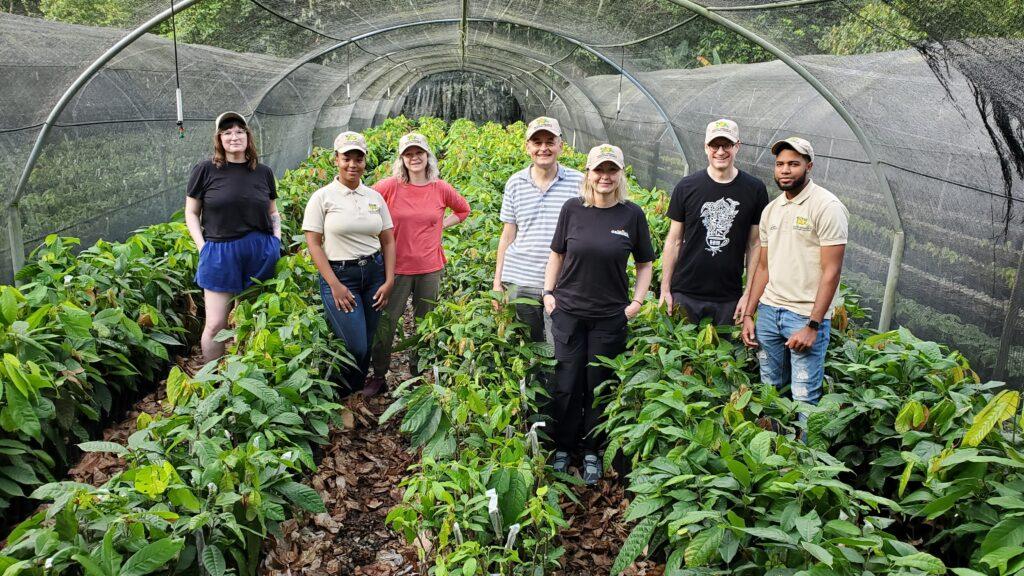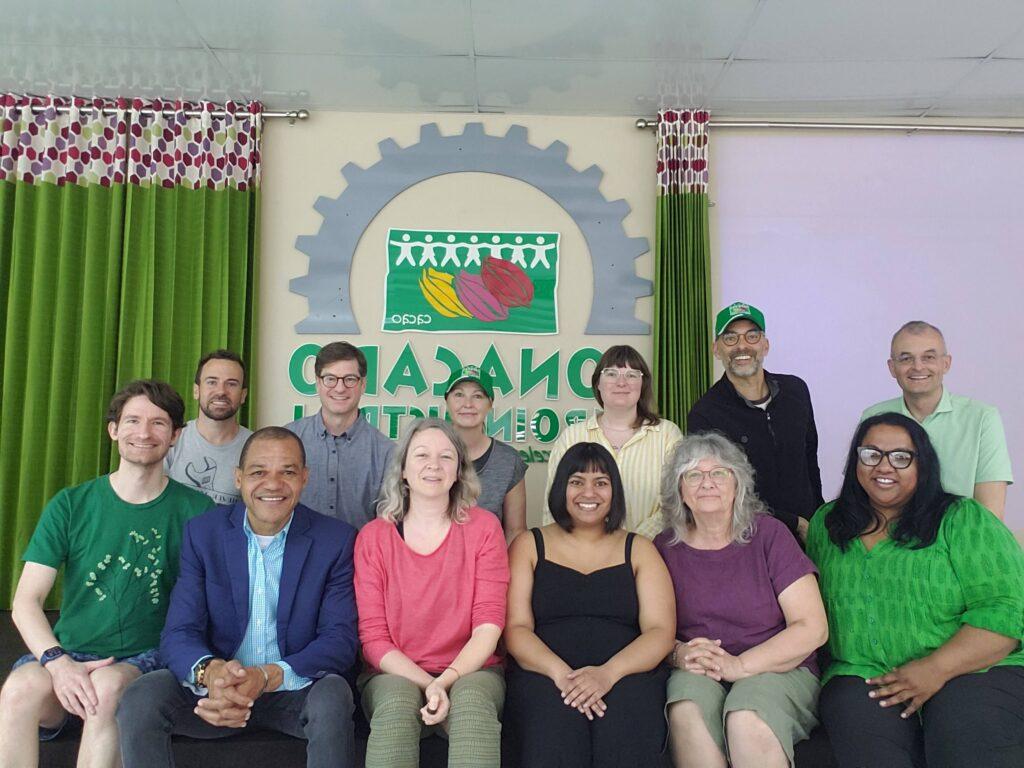Sugar has a bad reputation health-wise, and it’s well known we should all consume less of it. But for the little bit of sugar that we do eat, we should make sure that our purchases are meaningful.
For those times when you need to sweeten something, choosing our Camino fair trade and organic Golden cane or Whole brown sugars from small-scale farmers in Paraguay and Peru is an option that makes a real difference!
In part 1 of this article about Camino sugars, we shared the inspiring story of the small-scale sugar cane farmers and owners of the Manduvira Co-op, producers of our Golden cane sugar in Paraguay. In part 2, we will tell you how making Panela (whole brown sugar) has brought change to the small-farmer communities of the Sierra of Piura, Peru.
When sugar brings economic and social change
Camino Whole brown sugar is as unique as it is miraculous. In 1990 there was an agricultural crisis in Peru. Unable to make a living from farming, it seemed there was no future in agriculture, leading many people to leave their farms and migrate to the cities. During this time, poverty was amplified in urban areas as there was no work to be found, nor were there the necessary services to support a basic standard of living.
In the mid-1990s an idea was formed to organize producers of coffee in the hopes of improving options for coffee exports. One such organization, the Norandino co-op (formerly CEPICAFE), was created by several associations of coffee farmers and was later joined by cocoa farmers. Today, Norandino is an association comprised of 90 grassroots organizations with more than 4,800 small-scale coffee, sugar and cocoa producers, located in the Sierra of Piura, on the western slopes of the Andes Mountains, Peru.
Until the development by Norandino Co-op of an export market for their whole brown sugar (which they call Panela), sugar cane was a very marginalized commodity and had no commercial value. The sugar cane was usually processed into Chancaca – hard blocks of whole cane sugar – that was sold in local markets. It was processed directly on the farms with no hygiene standards and contained many impurities. Often, the cane was processed into a crude moonshine made in smoky huts on their farm. In the end, many of the locals preferred using white processed sugar over Chancaca for everyday use.
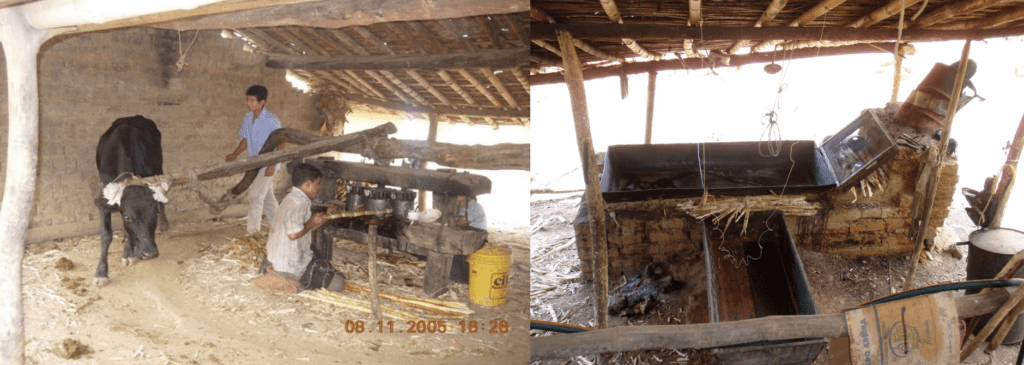
In the early 2000s, the Norandino co-op, with the help of an NGO and some co-op activists, changed all that. They recognized that cane sugar could be used as a way to diversify the revenues of their coffee and cacao farmers. By investing in training to improve the quality of the Panela and by installing local transformation centers with rigorous food safety standards, they created a market for whole brown sugar made from their unique mountain-grown organic sugar cane.
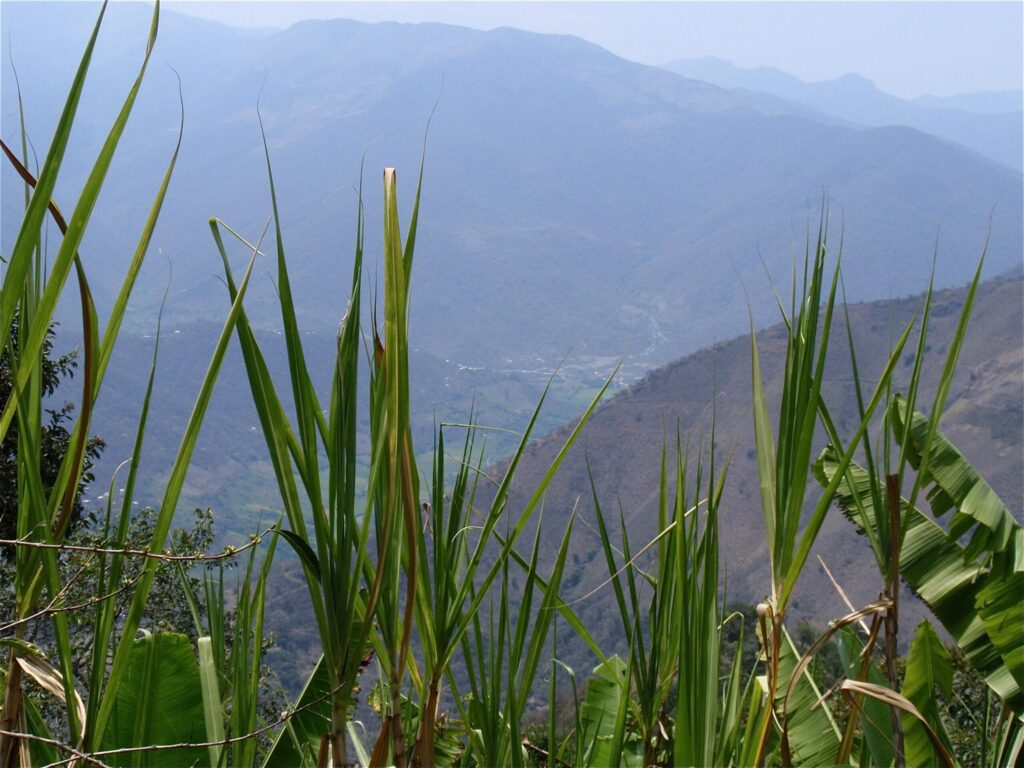
Now, each community transforms their sugar cane into Panela at the village level in small local processing plants called Modulos. The sugar cane is pressed to extract the juice which is then filtered, boiled, cooled down to start the crystallization of the sugar, dried, and bagged in 25kg large bags. Each village of the Montero region sends their sugar bags to Norandino’s packing plant in Piura, where the sugar gets crushed and re-packaged in our 1kg stand-up pouch, ready to be shipped to our warehouse along with some of their large 25kg bags.
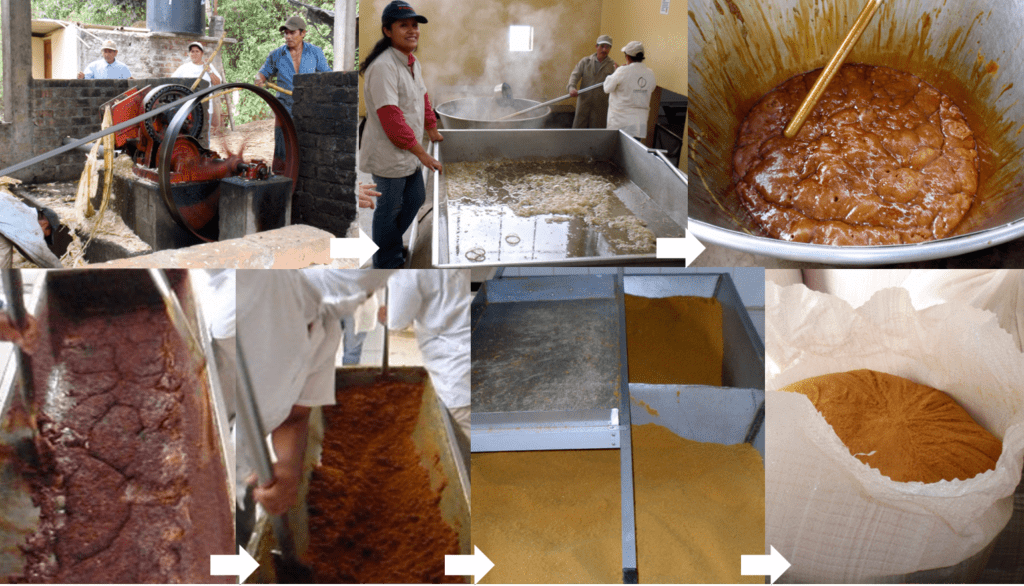
This whole new activity has created a profound change in the Sierra of Piura. One of the positive impacts of the work of Norandino has been the improvement of the health and well-being of the residents in those rural areas. Farmers who are now transforming their cane sugar into high-quality Panela have adopted and brought health measures from the Modulos to their homes and communities. Many producers have decided to invest in improvements such as modern sanitation systems and chimneys for cooking and reducing smoke, thus contributing to the long-term health of their communities.
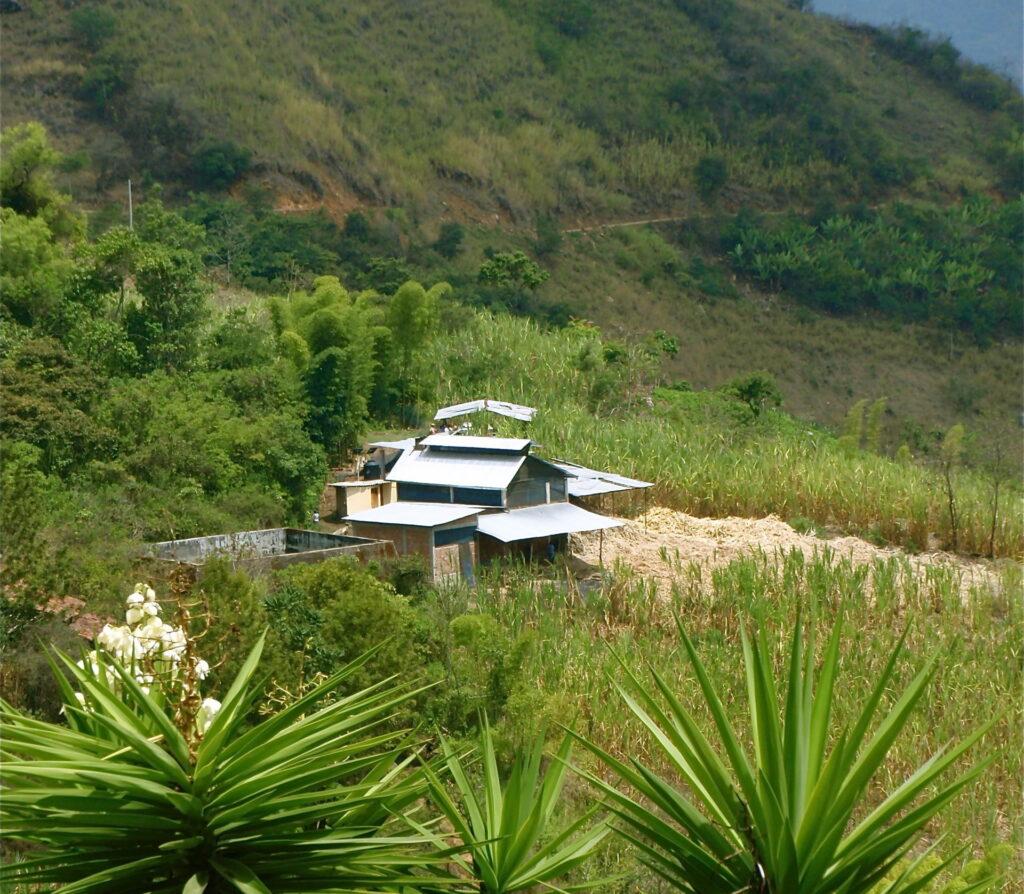
The sugar cane production is also attracting the youth back to farms, and people are increasingly returning from the cities. Many of the children of Norandino members, those who had left the villages to go to school in larger cities, are being hired by the co-op to work in the processing plants in Piura or work in the Modulos in rural areas, enabling them to return to their communities.
In all of the communities where Panela is now being processed and sold to Norandino, there has been a marked decrease in alcohol consumption as sugar cane now brings more value when processed into Panela than transformed into homemade alcohol.
Producing Panela, our Whole brown sugar, has resulted in substantial changes for the Norandino farmers and still does. It creates a new vibrant, sustainable industry that generates jobs and elevates the esteem and spirit of the producers themselves and of the members of their communities. There is actually a Panela festival every September in Montero, which has now been named the capital of Panela!
Unrefined organic sugar with natural goodness
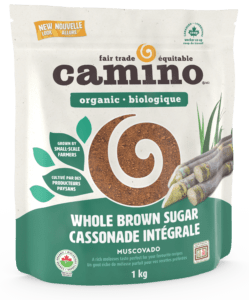 Given its history, it is no wonder that our Camino Whole brown sugar tastes amazing. It has complex and rich aromas.
Given its history, it is no wonder that our Camino Whole brown sugar tastes amazing. It has complex and rich aromas.
Right away, you’ll get notes of molasses, caramel, anise, and flowers from a brown sugar so tasty you won’t even need to use vanilla in your favourite recipes.
These are a few of our favourites: Rhubarb Strawberry Crisp, Muscovado Espresso BBQ Sauce, Double Chocolate Chip Cookies
Refreshing fair trade gelato
Nothing says summer like a nice frozen desert. At this point, what comes to mind is usually ice cream, but today we will be talking about “the other” ice cream: gelato.
We interviewed Prime gelato, who makes their unique gelato using our Camino fair trade and organic Whole brown and Golden cane sugars, along with our cocoa powder and chocolate couverture drops.
Camino: What are the main differences between Ice cream and Gelato?
Prime Gelato: The differences really come down to three factors: fat, air, and serving temperature. For instance, ice cream is usually made of cream, while gelato is mainly made of milk which contains less fat. Gelato is less aerated, making it a denser product with a more pronounced flavour profile. Lastly, gelato is served at slightly warmer temperatures than ice cream, which helps to release the flavour faster and more intensely.
Camino: Could you tell us a bit about Prime Gelato and the importance you place in sourcing quality ingredients?
PG: Prime Gelato handcrafts high-quality, creative, artisanal gelato. We are the only gelateria or ice cream shop in Northern Ontario that does not use any pre-made bases, pre-made flavouring pastes, colourants, or artificial flavourings of any sort. We bake, chop, grind, and freeze everything ourselves in our very own gelato Lab.
We believe in natural ingredients. There are no artificial flavours, no modified milk ingredients, no high fructose corn syrup, no fillers, no preservatives, and no artificial colours in any of our foods. We buy as many local raw ingredients as possible; milk, maple syrup, honey, wild blueberries, strawberries, pumpkins, carrots, beer, herbs, to name a few. We even make our homemade waffle cones using local Brule Creek flour.
Camino: How did you come about choosing Camino’s sugars to make your gelato?
PG: We want our products to be all fair trade. Your Golden and Whole brown cane sugars are part of the gelato base for every single flavour of ours. Your chocolate and cocoa powder are used for our Hot chocolate, Very chocolate, and Vegan chocolate truffle flavours, and the chocolate flecks in our Chocolate Flecked Coldbrew.
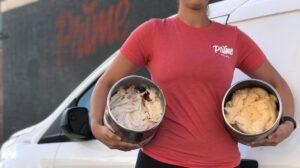
Visit www.primegelato.ca to learn more about this great Canadian company,
To conclude this two-part article about our Camino sugars, we would like to state that these incredible farmer co-op success stories have been made possible with access to stable fair trade and organic pricing and premiums, through the long-term relationships and commitments that have been built with partners such as our co-op La Siembra, and by extension, through your ongoing support to our Camino products.
Together we are supporting the work of democratically organized producer co-ops as they build vibrant communities for today and tomorrow.
Thank you for making a difference!
